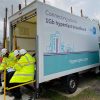UPDATE NGA Broadband Reaches 87.9% of UK as FTTH Tops 251K Premises
The latest information on superfast broadband availability has revealed that, at the end of June 2014, some 87.9% of premises in the United Kingdom were in areas that are listed as offering services via a Next Generation Access (NGA) network and some 251,522 (premises passed) were potentially within reach of a true ultrafast (100Mbps+) fibre optic (FTTH/P/B) connection.
The data, which stems from a sneak preview of a forthcoming Point Topic report that was given to ISPreview.co.uk, suggests a modest improvement in the availability of Fibre-to-the-Home (FTTH/P/B) style ultrafast broadband services. At the same time last year this figure was sitting at a total of just 186,500 premises (i.e. +65,022 or +34.86% annual growth).
Advertisement
As usual most of this growth in true fibre optic connectivity has come from BTOpenreach’s FTTP network, which is known to have around 150,000 premises passed under its belt. Last year BT’s FTTP deployments slowed in favour of a greater focus on their cheaper hybrid Fibre-to-the-Cabinet (FTTC) service, which has left room for faster FTTP/H/B rivals like B4RN, KC, IFNL, CityFibre, Hyperoptic and Gigaclear to grow, although BT are once again starting to pick-up the pace a bit through the Government’s Broadband Delivery UK (BDUK) programme.
Meanwhile both TalkTalk and Sky Broadband are also deploying some FTTH/P/B networks, albeit mostly alongside CityFibre in the city of York. At present none of these operators look likely to top BT’s solo total this year, although it does increasingly seem as if this side of the NGA market is being driven by alternative network operators (altnets).
Otherwise most of the UK market for next generation broadband services remain broadly dominated by slower hybrid-fibre connections, predominantly those supplied via BT’s up to 80Mbps capable FTTC technology and Virgin Media’s 152Mbps cable (DOCSIS3) platform. By contrast true fibre optic lines have the potential for delivering multi-Gigabit speeds, although most related services currently max out at 1000Mbps.
Premises Passed by Technology (June 2014)
* FTTB 56,907
* FTTP/H 194,615
* FTTx (FTTC) 19,902,146
* HFC (Cable/DOCSIS3) 13,354,000
Crucially Point Topic states that the 87.9% figure given at the start of this article assumes that all premises in an exchange that has been “activated” for any form of fibre and cable based service can achieve superfast speeds (note: the EU/Ofcom define this as 30Mbps+ and the UK Government puts the benchmark at 24Mbps+). As we know this doesn’t always reflect reality as many people, such as customers that reside too far away from an FTTC street cabinet, can struggle to receive speeds of greater than 24Mbps.
Advertisement
However Point Topic’s own street cabinet estimates, when run against activated telephone exchanges, found that FTTx (inc. FTTC) should be able to support 30Mbps+ to some 18.74 million premises (note: we’ll clarify the figure for 24Mbps+ by tomorrow). But the analyst admits that this figure appears to be higher than some other predictions, not to mention Ofcom’s recent availability estimate of 78% (here), and so caution is advised.
Similarly it’s often one thing to estimate performance using ideal circumstances and another to see what real-world customers on the ground are actually receiving, with many factors (e.g. poor home wiring, network congestion) having a potential to impact the results.
At this point it’s also important to remind readers that the United Kingdom is only home to a total of around 26.4 million households (note: we don’t have a reliable total for dedicated business premises) and thus there’s a lot of network overlap in the above table. Broadly speaking Virgin Media’s HFC/cable network is also almost entirely covered by BT’s rival FTTC service and a lot of the urban altnet FTTH/P/B deployments similarly overlap with rival networks.
But if you do choose to take Point Topic’s figure as gospel then the Government’s original aim of making “superfast broadband” (24Mbps+) speeds available to 90% of people in each local authority area by the end of 2015 now looks likely to be exceeded, with the next 95% target by 2017 seeming almost easy.
Advertisement
Elsewhere it’s worth remembering that BDUK’s rapid roll-out of FTTC with BT has so far stemmed from an initial focus on sub-urban areas, which will surely slow as the project starts to creep into increasing numbers of sparse rural communities (i.e. it takes longer to cover X amount of people).
UPDATE 11th September 2014
Apparently the figure able to support 24Mbps+ is 19.9 million, but take with a pinch of salt.
Mark is a professional technology writer, IT consultant and computer engineer from Dorset (England), he also founded ISPreview in 1999 and enjoys analysing the latest telecoms and broadband developments. Find me on X (Twitter), Mastodon, Facebook, BlueSky, Threads.net and Linkedin.
« Shropshire UK Confirm New Map and Next 13 Areas for Superfast Broadband
GiffGaff UK Scraps Unlimited Mobile Broadband Data Plans »

















































Comments are closed